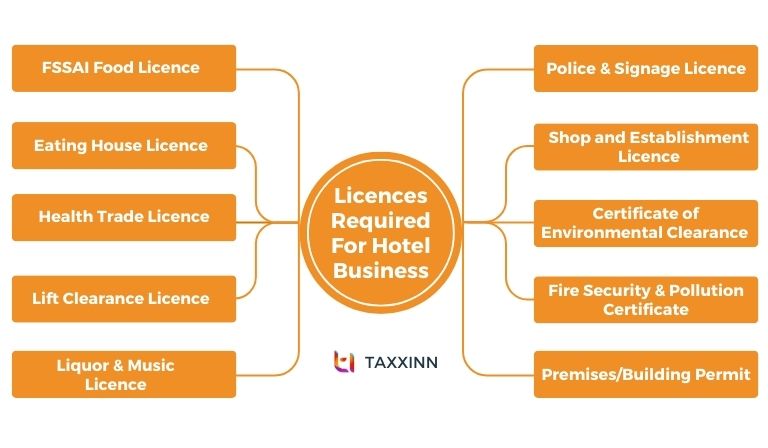The rapid population growth in India has created a growing demand for affordable hotel accommodations. This has led to significant opportunities in the hotel sector for those starting new businesses. The hotel industry has expanded substantially due to increased tourism, both domestically and internationally. India’s diverse attractions and cultures have made the hotel business one of the most profitable and ideal ventures, especially with the steady growth in international travel. Launching a hotel business in India is seen as a potentially lucrative endeavour.
Starting and running a hotel business in India necessarily requires a list of licences and registrations. Any permits must be received prior to the beginning of construction, so start early and keep in mind that they will take time to obtain. You’ll need to have group discussions to find the perfect place, hire good staff, and promote the hotel accordingly. As a result, it is important for startups in this sector to be aware of the list of licences required for the hotel business. And keep the company going properly. Furthermore, the laws and regulations for obtaining a hotel industry licence differ from state to state. Read further to know how many licences are required for hotel business in India.
List of Licences Required for Hotels in India
Business Registration:
Setting up a hotel as a legal entity like a private limited company or LLP is highly recommended. This choice allows for ease of transferring the business and limits personal liability for the company’s debts. Operating an unregistered hotel business can lead to personal liability for legal issues and debts, limited access to funding and partnerships, lower credibility, limited growth potential, and a lack the legal protections for registered businesses.
Shop and Establishment Licence:
To operate a food business in India, you must obtain a Shop and Establishment Licence within 30 days of starting your business. This licence is specific to the city in which your restaurant operates and typically costs between Rs.200 and Rs.4,000 annually. It usually takes 7-10 days to issue the certificate. Both home-based and outlet-based food business operators are required to have this certificate for their businesses to operate legally.
Food Licence/FSSAI Licence:
Any food business operating needs to apply for a food licence which is a commonly known FSSAI licence in India. The Food Safety and Standards Authority of India (FSSAI) is a self-governing organisation that works to ensure food safety and regulations in India. It is part of the Ministry of Health and Family Welfare of the Government of India. The Food Safety and Standards Authority of India (FSSAI) is associated with providing FSSAI licences to all food businesses and has made it possible to obtain a food licence before beginning a company.
There are three types of licences in the FSSAI licensing system. They are basic, state, and central licences. Let us discuss this in detail.
1. Basic Licence:
Petty food manufacturers, and small-scale food manufacturers, warehouses, transporters, distributors, and retailers, are all required to obtain FSSAI registration. Basic Registration for companies with an annual turnover of less than Rs. 12 lacs in a single state. Before the time limit expires, the FSSAI Licence must be renewed. Before the time limit expires, the FSSAI Licence must be renewed. This is issued by the state government for a period of one to five years.
2. State Licence:
Both small and medium-sized businesses that operate as suppliers, dealers, brokers, or distributors and have an annual turnover of more than 12 lakhs are required to obtain a State FSSAI licence. This licence has a limit of 5 years and a minimum of 1 year.
3. Central Licence:
Importers, Export Oriented Units, large manufacturers, and operators in Central Government agencies, airports, and seaports, among many others, must obtain a central food licence. This licence is required for businesses with annual revenue of more than 20 crore. The Central Government issues this licence for a period of 1 to 5 years.
Fire Security Certificate:
For running a hotel business, a fire safety certificate or permit is required from the Fire Department. Fire safety guidelines must be followed, and proper fire security arrangements should be in action. A fire safety certificate is issued to hotel businesses that must follow such fire safety standards. A No Objection Certificate (NOC) is also necessary from the fire department to run a restaurant.
Police Licence:
The Police Department keeps an eye on hotels because they are public places. As a result, all hotels must keep a proper list of all guests who have stayed at the hotel, follow all local rules, and have a required Police Department permit.
Health Trade Licence:
The Health Trade Licence is regulated in the 11th schedule of the Municipal Corporation Act (1957). A health trade licence from the local Health Department is generally required. This licence is issued by the local municipal government. The issuance of a health trade licence is dependent on compliance with relevant hygiene and safety standards that are important for public health.
Eating House Licence:
Every area where the public is allowed and where any kind of food or drink is provided for consumption on the premises is referred to as an eating house. The Eating House Licence is issued by the city’s Licensing Police Commissioner. The average cost of capital for this licence for three years is Rs.300.
ESI Registration:
ESI is a government of India-owned Company that works under the Ministry of Labour and Employment. There is a hotel company licence as well. For companies in India with ten or more employees, registration with the Employees State Insurance is required. For all employees earning Rs.15,000 or less, the company would pay 4.75 per cent of their salaries to ESI employer dues. The employee must pay 1.75 per cent of his or her salary in ESI contributions.
PF Registration:
In India, any business employing more than one employee must register with the Employee Provident Fund (PF). The PF Board is responsible for managing a contributory provident fund, a pension plan, and an insurance scheme for workers in India’s organised economy.
Bar Licence:
A bar licence would be required from the relevant authorities if the hotel runs a bar or serves alcohol in its restaurants. Departments under the State Government are usually the ones that issue bar licences. As a result, the conditions for obtaining a bar licence differ from state to state.
Lift Clearance Licence:
If your hotel is multi-storied and you want to operate a lift, you will need to get permission to do so. After verifying the installation of the lift, structure, safety gears, and other products, the Electrical Inspector issues this licence from the Labour Commissioner’s office. For receiving lift clearance, state-specific applications are available.
Music Licence:
A restaurant music licence is required to play music in your restaurant. Phonographic Performance Limited is the company behind it (PPL). All companies need a licence. PPL represents record companies and artists in the use of recorded music. If a restaurant plays music and does not have the necessary licence, it will face legal consequences
Signage Licence:
To ensure that your restaurant makes the most money, you must advertise it effectively. You must acquire a valid permit, which is the signage licence if you wish to advertise your restaurant by signs, flyers, photographs, and symbols. Local civil authorities, such as municipal corporations, may provide you with this licence.
Certificate of Environmental Clearance (CEC):
The restaurant is responsible not only for the health of its customers but also for the environment. As a result, restaurants must still apply for a Certificate Of Environmental Clearance.
How can Taxxinn help you?
Taxxinn is a one-stop solution for getting the required licences for hotels. We help you get your registrations done at a low cost while providing high-quality service. Starting from company registration, and FSSAI registration to any legal requirements service. Our expert teams are always ready to help you at any stage of the process. Contact us right away to get started.



